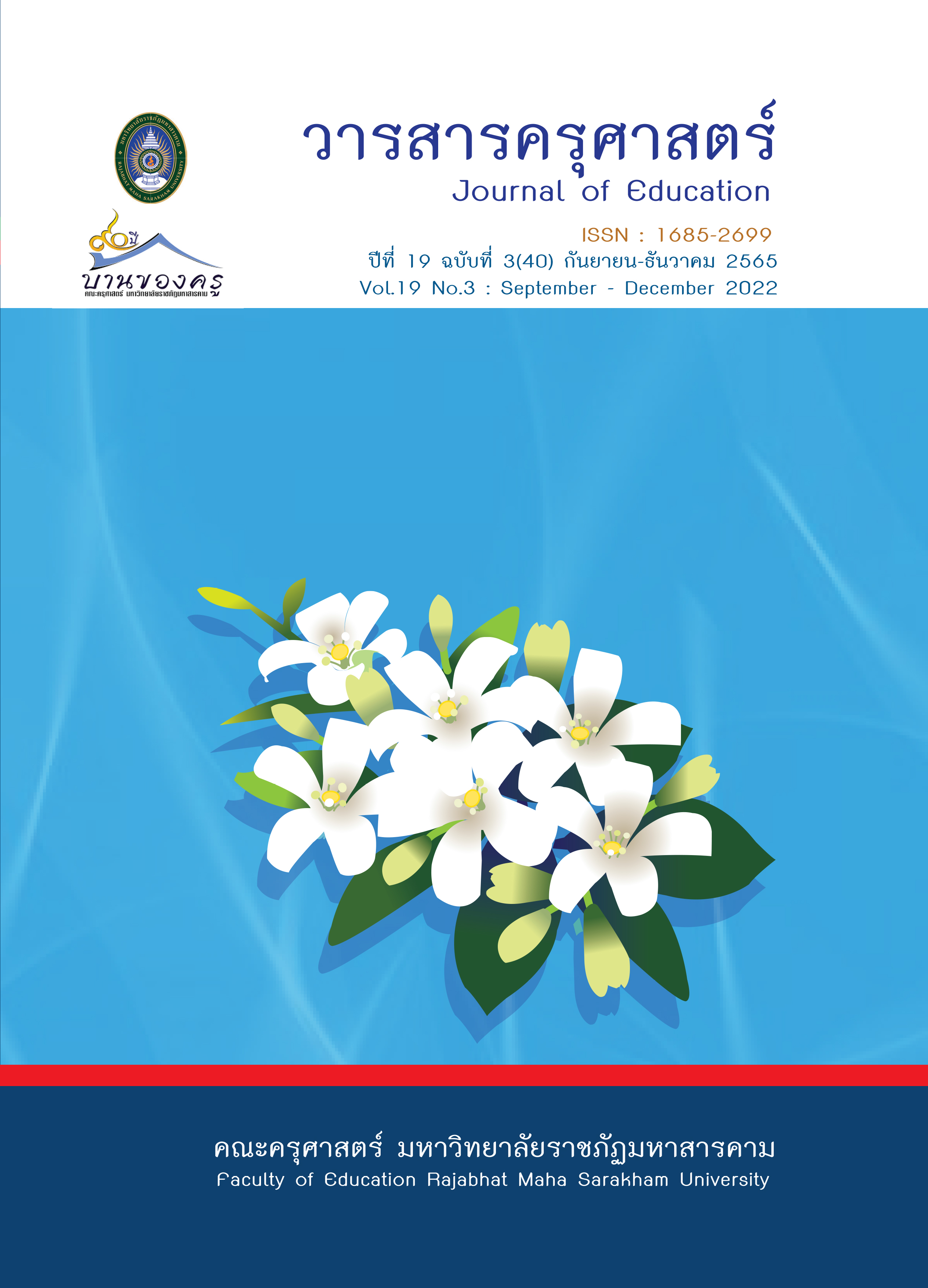The Approaches of New Normal Science Learning Management: Content Analysis
Main Article Content
Abstract
The purposes of this research were to analyze classroom action research articles and summarize the approaches of a new normal science learning management for lower secondary level. The sample group was 21 research articles of the pre-service general science teachers from 54 research articles, published in the proceeding of science and technology session in the 4th national academic conference for undergraduate students in education on March, 2022, selected by purposive selection and passed the research quality criteria. The research instruments were a research quality assessment form and an assessment form for the new normal learning management. The data were analyzed by using descriptive statistics and content analysis.
The results showed that 1) all research articles were classroom action research. The most of the research articles emphasized on innovative online learning to improve 21st century skills (52.38 percent) and followed by the development of the new normal learning management process (47.62 percent) and 2) the new normal learning management approach was at a very good level ( = 4.60, S.D.= 0.51) consisted of 4 steps: 1) preparation of online learning, 2) motivation engagement, 3) 5Es scientific inquiry-based learning and 4) evaluation and extension. The recommendation for future study is to apply the learning management approach for teaching and learning at other levels
Article Details

This work is licensed under a Creative Commons Attribution-NonCommercial-NoDerivatives 4.0 International License.
ข้อกำหนดเบื้องต้นที่ผู้นิพนธ์(ผู้ส่งบทความ) ควรทราบ
1. ผู้นิพนธ์ที่ประสงค์จะลงตีพิมพ์บทความกับวารสาร ตั้งแต่เดือนมกราคม 2563 เป็นต้นไป ให้ใช้รูปแบบใหม่ (Template 2563) โดยสามารถดูตัวอย่างได้ที่เมนู GUIDELINES
2. จะตีพิมพ์และเผยแพร่ได้ ต้องผ่านการประเมินจากผู้ทรงคุณวุฒิ (Peer Review)
3. การประเมินบทความโดยผู้ทรงคุณวุฒิ (Peer Review) เป็นแบบ Double Blind
4. การอ้างอิงบทความใช้หลักเกณฑ์ APA (American Psychological Association) คลิก
5. บทความถูกปฏิเสธการตีพิมพ์ ไม่ผ่านการประเมิน ผู้นิพนธ์ขอยกเลิกเองหรือชำระเงินก่อนได้รับการอนุมัติ ทางวารสารไม่มีนโยบายการคืนเงิน
References
กระทรวงศึกษาธิการ. (2563). นโยบายและจุดเน้นของกระทรวงศึกษาธิการ ปีงบประมาณ พ.ศ.
http://www.reo2.moe.go.th/home/index.php/login/2018-10-17-08-14-28/5882563
กาญจนา บุญภักดิ์. (2563). การจัดการเรียนรู้ยุค New Normal. วารสารครุศาสตร์อุตสาหกรรม, 19(2), A1–A6.
กิตติชัย สุธาสิโนบล. (2562). หลักสูตรและการเรียนรู้แบบดิจิทัล. วารสารวิชาการศึกษาศาสตร์, 20(1), 200–211.
เจษฎา ราษฎร์นิยม. (2564). ผลของการใช้ Kahoot เป็นเครื่องมือช่วยวัดประเมินผลระหว่างเรียนในการจัดการเรียนรู้
แบบ 4E×2 ที่มีต่อผลสัมฤทธิ์ทางการเรียนและความสามารถในการคิดวิเคราะห์. วารสารวิทยาศาสตร์และ
วิทยาศาสตร์ศึกษา, 4(2), 264–278.
พวงเพชร นรทีทาน และ ธีรภัทร์ ถิ่นแสน. (2564). การจัดการเรียนการสอนออนไลน์ภายใต้สถานการณ์โรคอุบัติใหม่.
วารสารวิชาการรัตนบุศย์, 3(2), 84–91.
วิทยา วาโย. (2563). การเรียนการสอนแบบออนไลน์ภายใต้สถานการณ์แพร่ระบาดของไวรัส COVID-19:
แนวคิดและการประยุกต์ใช้จัดการเรียนการสอน. วารสารศูนย์อนามัย, 14(34), 285–298.
สถาบันส่งเสริมการสอนวิทยาศาสตร์และเทคโนโลยี. (2564). Project 14 แก้ปัญหาเรียนออนไลน์ พลิกวิกฤตเป็น
โอกาส. https://www.ipst.ac.th/news/14050/20210803-proj14.html
สำนักงานเลขานุการสภาการศึกษา. (2564). รายงานการศึกษาไทย พ.ศ. 2562-2564. พริกหวานกราฟฟิค จำกัด.
Belarmino, J.A. & Bahle-Lampe, A. (2019). A preliminary historical report on embracing online education in
occupational therapy. Open Journal of Occupational Therapy, 7(3), 1–10.
Care E. (2018). In Assessment and Teaching of 21st Century Skills. Springer Cham.
Narine L, Meier C. (2020). Responding in a time of crisis: Assessing extension efforts during
COVID-19. Advancements in Agricultural Development 2020, 1(2), 12–23.


